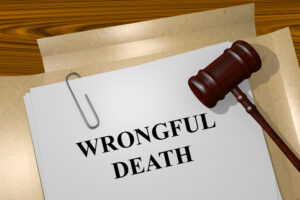Suing For Wrongful Death In Florida

Accidents are always frightening, but if you are unfortunate enough to lose a loved one, it can feel as though your entire world has turned upside down. This goes double if your loved one’s passing happens due to another person’s recklessness or negligence. If a death happens due to another person’s reckless, negligent, or indifferent conduct, the surviving family members may be able to seek compensation from the defendant for wrongful death. While money will not bring back your loved one, it can at least help ease the financial transition.
Who Can File And When?
Florida’s Wrongful Death Act states that if someone dies due to the “wrongful act, negligence, default” or breach of contract/warranty of another person, and the decedent would have been able to mount a civil suit against the negligent actor had they survived, a wrongful death action can be brought by the personal representative of the deceased’s estate on behalf of the surviving family members. Specifically, the family members who may be able to recover are the surviving spouse, parents, and children of the deceased, as well as any adoptive siblings or other blood relatives “partly or wholly dependent on the decedent for support or services.”
The state’s wrongful death law also establishes a statute of limitations, meaning a window of time in which a wrongful death suit must be filed. Florida allows four years after the date of the person’s passing in which a suit can be brought. Once this period ends, however, any potential cause of action is invalid – waiting too long means that evidence decays, memories become less accurate, and in general, it is more difficult to bring a successful case to court without credibility issues.
Multiple Types of Damages
It can be difficult to determine the types of damages that are obtainable if you are able to establish liability for wrongful death, at least partly because many of the causes of action are somewhat vague. Examples include lost value of support and services, loss of consortium (loss of marital relations and support), loss of companionship/guidance, and general pain and suffering. These are known as non-economic damages, which means that they are hard to quantify – but they are still very valid.
Other types of damages that are easier to put a number to are called economic damages, and they include medical bills, funeral expenses, and other expenses incurred by either family members or the estate. Some cases may warrant punitive damages – that is, damages awarded solely for the purpose of punishing willfully malicious or reckless conduct by the defendant – but this is extremely rare. The standard to prove malice is higher than proving negligence, and most often it is not met.
Call An Orlando Wrongful Death Lawyer
Losing a loved one is never easy, but losing one too early is worse. If this has happened in your family, the Orlando wrongful death attorneys at the Hornsby Law Group can help guide you through the process of filing suit, so that hopefully you can at least get back on more solid financial footing as you process the loss. Contact our offices today for a free consultation; we offer compassionate and dedicated representation.
Resource:
flsenate.gov/Laws/Statutes/2018/0768.18
http://www.leg.state.fl.us/statutes/index.cfm?App_mode=Display_Statute&URL=0700-0799/0768/Sections/0768.21.html
https://www.hornsbylawgroup.com/workers-compensation-wrongful-death/